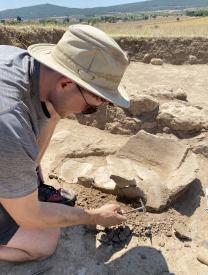Scott received his B.A. in Archaeology and Heritage Studies with a specialization in Near Eastern and Classical Studies at Wilfrid Laurier University. Most recently, Scott graduated with an M.A. in Greek and Roman Studies from the University of Victoria in 2023. His M.A. thesis argues that the distribution, production, and usage of obsidian and chert tools persisted into the 12th century BCE despite claims that bronze implements had effectively rendered them obsolete by the turn of the Late Bronze Age (LBA) (c. 1700 BCE). He presents a new lithic assemblage from Early–Late Mycenaean Eleon in east-central Greece (c. 1700–1200 BCE), a site where he has worked in excavation and survey since 2017. Scott has also excavated at Olynthos in northern Greece (2018) and surveyed in the western Argolid plain in south-central Greece (2015). Currently, he serves as a Student Representative of the Canadian Institute in Greece (CIG) and complements his Mediterranean-based skill set with archaeological experience in North America. Namely, he has worked as a professional archaeologist and held multiple collections management positions organizing and cataloguing Indigenous and Historic artifacts in southern Ontario (Canada).
Broadly construed, Scott’s research interests lie in Greek archaeology, focusing on the Late Bronze Age through Early Iron Ages (LBA–EIA) (roughly 17th to 8th centuries BCE) in the Aegean and eastern Mediterranean. Thematically, he strives to address questions related to the complexities of ancient economies, exchange networks, craft production, and human-environment interaction. In particular, Scott is interested in periods in which socioeconomic upheaval and economic contraction are evident, such as the LBA–EIA transition. Lastly, he will endeavour to apply petrographic analyses to the study of ceramics from the ancient Mediterranean through resources available in the Center for Analysis of Archaeological Materials (CAAM) at Penn.

